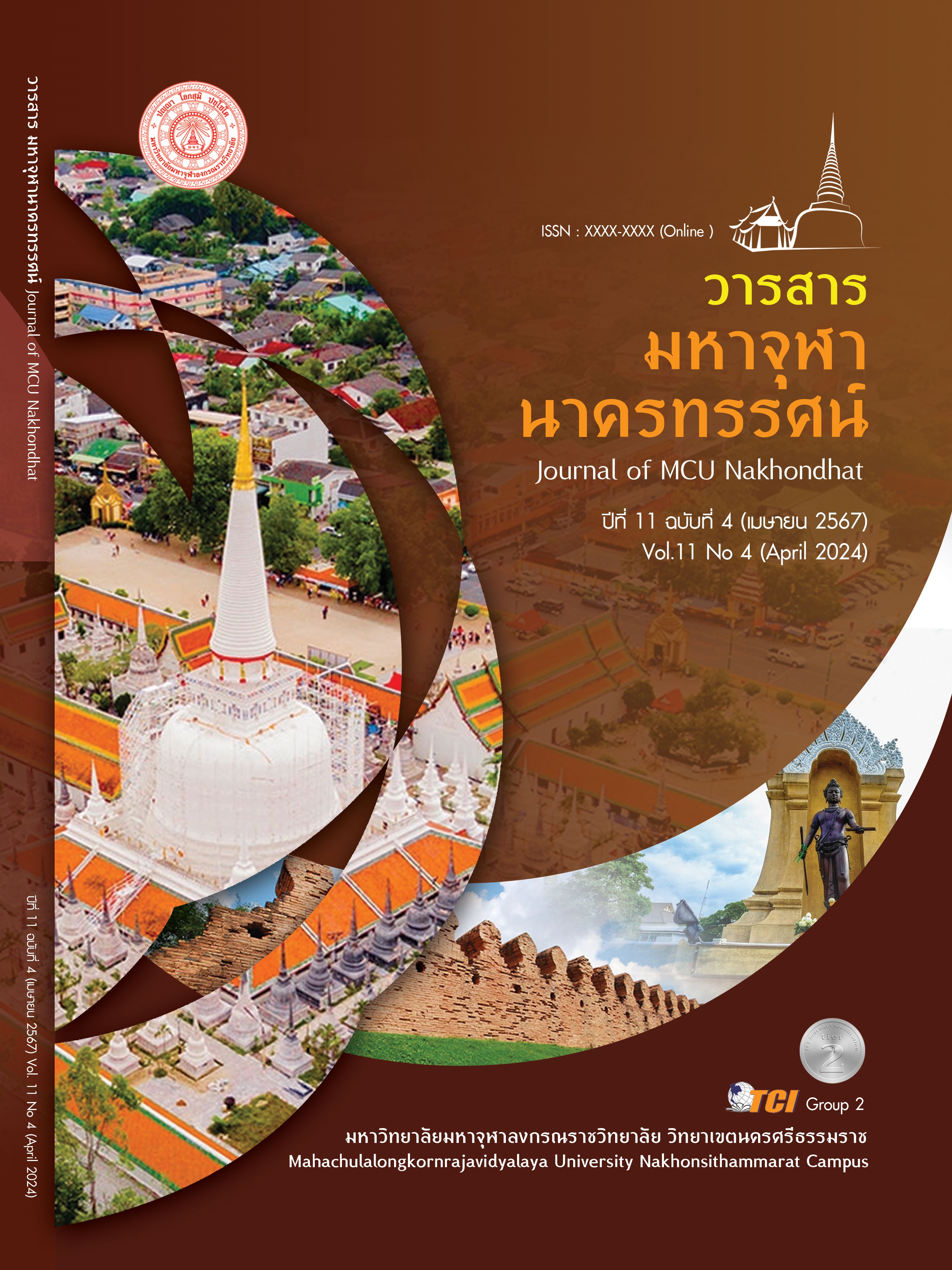A DEVELOPMENT OF ECO - TOURISM SUSTAINABLE USING THE COMMUNITY AS A BASIS OF NAYONG DISTRICT, TRANG PROVINCE
Main Article Content
Abstract
The objectives of this research are 1) To Study the development of sustainable ecotourism destinations using the community; It is the base of Na Yong District, Trang Province and 2) To Study suggestions and guidelines for developing tourist attractions. Sustainable ecological research using the community as a base in Na Yong District, Trang Province. It is a mixed method research (Mixed Methods Research) consisting of qualitative research. Data were collected by interviewing 20 key informants including villagers in tourist destination areas tourist attraction operators community development academics local leaders community enterprises cultural academics Expert in forestry and quantitative research Data were collected by distributing questionnaires to a sample population of 375 people. The sample size was determined using Krejci and Morgan's formula. The results of the research found that 1) Community - based sustainable development of eco - tourism destinations in Na Yong District, Trang Province, including community participation in the development of tourist attractions. Policy and Ecotourism Strategy In providing knowledge and creating awareness Management aspect in taking advantage of Space for sustainability and the potential to be an eco-tourism destination There is a high level of development ( = 3.59) and 2) Suggestions and guidelines for developing sustainable ecotourism destinations using community
as a base. of Na Yong District, Trang Province, found that every sector must participate in planning. There is efficient space management, low - impact infrastructure use. Social space management leads to a strong community You can organize your own community tours.
Article Details

This work is licensed under a Creative Commons Attribution-NonCommercial-NoDerivatives 4.0 International License.
References
พยุงพร ศรีจันทวงษ์. (2563). การพัฒนาการมีส่วนร่วมของชุมชนต่อการจัดการแหล่งท่องเที่ยวเชิงนิเวศวัฒนธรรมภูเตาโปงบ้านบุ่งกุ่ม ตำบลนาหอ อำเภอด่านซ้าย จังหวัดเลย. วารสารวิจัยและพัฒนามหาวิทยาลัยราชภัฏเลย, 15(51), 33-43.
พัชรินทร์ จึงประวัติ. (2560). ความต้องการของชุมชนในการพัฒนาศักยภาพเพื่อการจัดการท่องเที่ยวเชิงอนุรักษ์: กรณีศึกษาตลาดคลองสวนร้อยปี อำเภอบางบ่อ จังหวัดสมุทรปราการ. วารสารการบริการและการท่องเที่ยวไทย, 12(1), 36-49.
ไพริน เวชธัญญะกุล. (2563). การท่องเที่ยวเชิงนิเวศสู่การท่องเที่ยวอย่างยั่งยืน. วารสารการพัฒนาท่องเที่ยวสู่ความยั่งยืน, 2(1), 51-63.
ภาสกร จวนสาง. (2565). การประเมินศักยภาพของชุมชนในการพัฒนาเป็นแหล่งท่องเที่ยวเชิงนิเวศและวัฒนธรรม กรณีศึกษาชุมชนบ้านท่าล้ง จังหวัดอุบลราชธานี และชุมชนบ้านท่าวัด จังหวัดสกลนคร. วารสถาบันวิจัยและพัฒนา มหาวิทยาลัยราชภัฏมหาสารคาม, 9(1), 353-374.
ยุวดี นิรัตน์ตระกูล. (2539). การท่องเที่ยวเชิงอนุรักษ์. ขอนแก่น: ศูนย์การศึกษาต่อเนื่อง มหาวิทยาลัยขอนแก่น.
ราณี อิสิชัยกุล และรชพร จันทร์สว่าง. (2560). การพัฒนามาตรฐานแหล่งท่องเที่ยวเชิงนิเวศของประเทศไทย. วารสารวิทยาลัยดุสิตธานี, 11(ฉบับพิเศษ), 1-17.
สำนักงานสภาพัฒนาการเศรษฐกิจและสังคมแห่งชาติ (สศช.). (2565). แผนพัฒนาเศรษฐกิจและสังคมแห่งชาติ ฉบับที่ 13 (พ.ศ.2566 - 2570). เรียกใช้เมื่อ 18 ตุลาคม 2565 จาก https://www.nesdc.go.th.
อัจฉราพรรณ ตั้งจาตุรโสภณ และคณะ. (2563). โมเดลสมการโครงสร้างความจงรักภักดีของนักท่องเที่ยวชาวไทยที่มีต่อจุดหมายปลายทาง ในการท่องเที่ยวภาคตะวันออกเฉียงเหนือ ประเทศไทย. วารสารชุมชนวิจัย มหาวิทยาลัยราชภัฏนครราชสีมา, 14(2), 174-188.
อุษณีย์ วัชรไพศาลกุล. (2563). แนวทางการสร้างมูลค่าเพิ่มของแหล่งท่องเที่ยวเชิงนิเวศเพื่อพัฒนาเศรษฐกิจและการท่องเที่ยวอย่างยั่งยืนในพื้นที่คุ้งบางกะเจ้า อำเภอพระประแดง จังหวัดสมุทรปราการ. วารสารมนุษยศาสตร์และสังคมศาสตร์มหาวิทยาลัยธนบุรี, 14(3), 107-119.
Lascurain, C. (1991). Tourism, ecotourism and protected areas park.UK: International Organizati on for Conservation of Nature.


